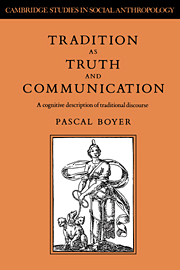Book contents
- Frontmatter
- Contents
- Preface
- Acknowledgements
- 1 Conserved world-views or salient memories?
- 2 How to think with ‘empty’ notions
- 3 Criteria of truth
- 4 Customised speech (I): truth without intentions
- 5 Customised speech (II): truth without meaning
- 6 Customised persons: initiation, competence and position
- 7 Conclusions and programme
- Notes
- Bibliography
- Index
- Cambridge Studies in Social Anthropology
- Frontmatter
- Contents
- Preface
- Acknowledgements
- 1 Conserved world-views or salient memories?
- 2 How to think with ‘empty’ notions
- 3 Criteria of truth
- 4 Customised speech (I): truth without intentions
- 5 Customised speech (II): truth without meaning
- 6 Customised persons: initiation, competence and position
- 7 Conclusions and programme
- Notes
- Bibliography
- Index
- Cambridge Studies in Social Anthropology
Summary
Questions of truth are both crucial to the study of traditions and usually overlooked in anthropological theories. Anthropologists generally avoid using such terms as ‘true’ and ‘false’ when describing the status of traditional statements. They use some vague terms, such as ‘symbolic’ or ‘symbolico- expressive’, ‘significant’, ‘relevant’, ‘meaningful’, etc. There is a sharp contrast between this usage and the views of the people concerned. No one in a traditional society would ask a diviner to make a ‘significant’ or ‘relevant’ statement about any situation, nor would people be satisfied if a shaman claimed to make ‘meaningful’ findings in his journeys to other worlds. What is sought in such contexts is a true description of a situation; indeed, the production of truths is the raison d'être of many types of traditional interaction. Divination comes to mind immediately, as a ritual, the explicit purpose of which is to make a true diagnosis; but it is by no means the only such context. All anthropologists have been told by informants that certain persons knew ‘the truth’ about certain matters because they had been initiated, or that certain myths contained some ‘truth’ about the ancestors, while other persons or stories were described as mistaken or misleading. Truth is very much a traditional concern, and the anthropological use of woolly terms (‘symbolic’, ‘meaningful’, etc.) is rather misleading.
- Type
- Chapter
- Information
- Tradition as Truth and CommunicationA Cognitive Description of Traditional Discourse, pp. 46 - 60Publisher: Cambridge University PressPrint publication year: 1990

